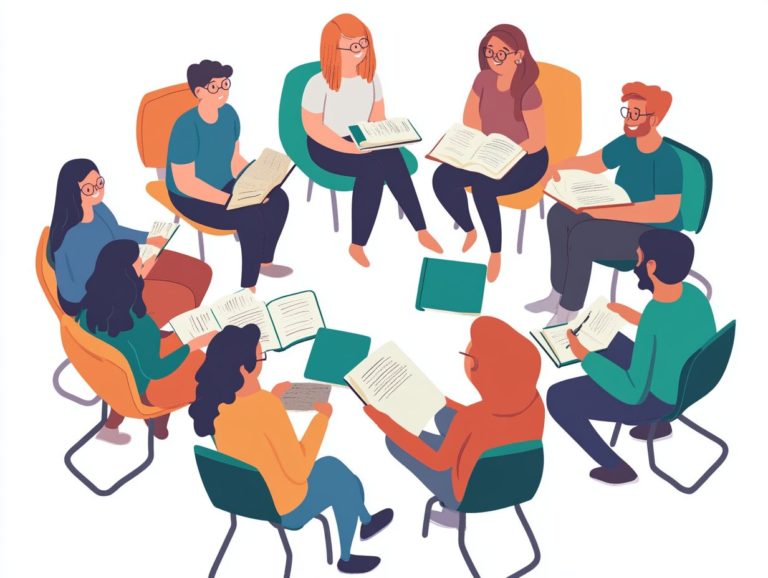How to Prepare for a Language Proficiency Exam
Preparing for a language proficiency exam may seem intimidating. However, grasping the structure and purpose of these assessments can significantly ease your journey.
This guide is designed to help you navigate every aspect, from different exam formats and question types to effective study strategies and essential tips for exam day.
Whether your goal is to enhance your language skills or refine your test-taking techniques, you’ll uncover valuable insights that pave the way for your success.
Jump in now to learn how to prepare effectively and tackle your exam with confidence!
Contents
Key Takeaways:

- Understand the exam format and requirements to better prepare for a language proficiency exam.
- Create a study plan and utilize effective strategies for preparation to maximize your language skills.
- Develop test-taking strategies and use last-minute tips to improve your performance on exam day.
Overview of Common Exams and Their Purpose
Foreign language exams, such as those from the Goethe-Institut, TRKI, and IELTS, are essential tools for evaluating your language proficiency across various skills, including listening, reading, speaking, and writing.
These assessments cater to different levels, ranging from beginner to advanced, ensuring that you gain a clear understanding of your language capabilities.
These language tests are important for more than just grades; they are crucial for building strong communication skills that help you navigate diverse social and professional landscapes.
Aligned with the Common European Framework of Reference for Languages (CEFRL), these exams offer an internationally recognized standard for measuring your language competence. By preparing you for real-world communication scenarios, they enhance your employability, open doors to academic opportunities, and enrich cross-cultural interactions.
These assessments also boost your confidence, allowing you to articulate ideas and engage in meaningful conversations ultimately enhancing your entire language learning experience.
Understanding the Exam Format and Requirements
Understanding the exam format and requirements is essential for effective exam preparation.
Each language proficiency test, including the TRKI and DELF, features its own unique structure and assessment methods specifically designed to gauge your individual language skills.
By familiarizing yourself with the various exam sections such as reading comprehension, listening skills, writing skills, and speaking skills you can significantly enhance your performance on test day.
Types of Questions and Time Limits

Different language exams present a range of question types specifically designed to assess your language skills, and grasping these can significantly enhance your exam performance.
You’ll encounter common formats like multiple-choice questions, open-ended writing tasks, and oral interviews, each accompanied by strict timing strategies to evaluate your reading, writing, speaking, and listening abilities.
Mastering the timing for each section is vital, as it gives you the power to allocate your efforts effectively throughout the exam. For example, multiple-choice questions often demand quick decision-making, while writing tasks require thoughtful consideration and planning.
Engaging in practice tests not only familiarizes you with the various question types but also helps you develop a rhythm that can bolster your confidence on exam day.
Mock tests simulate the pressures and time constraints of the actual exam, offering invaluable insights into your strengths and areas for improvement. This ultimately leads to better preparedness and enhanced performance when it truly counts.
Creating a Study Plan
Creating an effective study plan is essential for your exam preparation, especially for language proficiency tests such as the IELTS or Goethe-Institut.
A thoughtfully designed study schedule that embraces various techniques like utilizing preparation materials and tackling practice questions can significantly enhance your understanding of the exam structure and elevate your confidence when it s time to take the test.
Effective Strategies for Preparation
Effective preparation strategies are essential for excelling in foreign language exams. They help students maximize their potential and avoid common pitfalls.
Techniques like regular personal evaluation through practice tests and mock exams, coupled with stress management strategies, form the backbone of a robust preparation plan.
As students embark on their journey towards language proficiency, incorporating a variety of study methods can significantly elevate their learning experience.
For example, participating in conversation clubs and immersing themselves in the language through films and literature enhances practical application and builds confidence.
To tackle exam anxiety, students can employ mindfulness and relaxation techniques that help maintain a calm focus on exam day.
Prioritizing effective exam day strategies is crucial. This includes planning arrival times, ensuring adequate rest, and having a structured review system to navigate any challenges that may arise during assessments.
Improving Language Skills

Enhancing language skills in reading, writing, speaking, and listening is crucial for excelling in language exams. With focused practice and the right resources, students can significantly elevate their proficiency.
It’s important to incorporate a diverse array of language learning materials into study routines. This approach not only equips students for exams but also aligns with examiners’ expectations, setting them up for success.
Resources and Techniques for Language Practice
Utilizing a wide array of language learning resources and techniques is essential for effective language practice, preparing students for various components of their exams. Resources such as online tests, practice exams, and focused exercises in speaking, writing, reading comprehension, and listening comprehension offer invaluable experience and familiarity with exam formats.
Interactive platforms like language exchange websites and mobile applications allow students to engage in real-time conversations and receive immediate feedback, significantly enhancing verbal fluency.
Participating in peer review exercises sharpens editing and critical thinking skills related to writing.
Timed practice tests simulate exam conditions, helping students pinpoint areas requiring more attention. Engaging with online learning communities provides motivation and support as students track their progress over time.
This comprehensive approach addresses every aspect of language acquisition, ensuring students are well-prepared for success.
Developing Test-Taking Strategies
Developing effective test-taking strategies is essential for optimizing performance during language proficiency exams. This allows students to navigate each section with efficiency.
Master timing strategies and understand the questions and assessment criteria to approach the exam with confidence and skill.
Tips for Approaching Different Types of Questions

Approaching different types of questions with finesse can significantly impact exam outcomes, especially in foreign language assessments where clear understanding is vital.
Familiarizing students with various exam formats and employing effective strategies can elevate overall performance. To enhance preparation, actively engage with each exam component: reading, writing, speaking, and listening.
For reading comprehension, mastering skimming and scanning techniques helps quickly identify main ideas. In writing tasks, outlining thoughts and practicing coherent structure leads to more articulate responses.
Improve speaking skills by rehearsing common topics and participating in mock conversations. Listening skills flourish through consistent practice with diverse audio materials, helping students acclimate to different accents and speeds. This practice ultimately boosts confidence and competence when faced with the exam.
Preparing for the Exam Day
Preparing for exam day means planning ahead and managing stress well. This helps you perform at your best during language exams.
Key tips for a successful exam day include:
- Arriving early
- Wisely managing your time
- Having all necessary resources at hand
This preparation reduces anxiety and leads to a smoother test experience, allowing you to focus on what truly matters your performance.
Last Minute Tips and Strategies
As exam day nears, use last-minute tips to boost your confidence and readiness. Simple practices like reviewing key concepts, employing effective timing strategies, and utilizing available exam resources can help ease stress.
Maintaining a positive mindset is essential. Focus on affirmations and visualize your success to elevate your mental state. Engaging in group study sessions or discussions can reinforce your understanding and make learning more dynamic.
Light physical activity can really boost your energy and calm your nerves try stretching or taking a brisk walk! This can invigorate your mind and diminish anxiety as the exam approaches.
Also, prioritize sleep and proper nutrition in these final days. Doing so supports how well your brain works and cultivates an overall sense of readiness and motivation.
Post-Exam Reflection and Next Steps
After the exam, take time to reflect on your performance. This is a great chance to plan for your next language test.
By diving into your exam results and engaging in a comprehensive self-assessment, you can gain insights that inform your decisions regarding further study. This process helps pinpoint areas that require improvement and equips you with strategies to achieve even higher scores in upcoming exams.
Evaluating Performance and Planning for Future Exams
Evaluating your performance after a language exam is essential for shaping your path toward future assessments. This reflection helps you refine your study strategies and preparation materials.
By analyzing your exam results against the assessment criteria, you can identify specific areas needing improvement and inform your overall language learning approach. This evaluation process involves a meticulous review of the feedback provided by examiners, which highlights both your strengths and weaknesses.
Pay close attention to qualitative comments and quantitative scores. This approach will give you a comprehensive understanding of your capabilities. By interpreting these outcomes, you’ll be able to identify what needs enhancement and which techniques and resources have proven effective.
This reflection is crucial for planning your next steps. It allows you to set realistic goals and craft a targeted study plan, increasing your chances of success and creating a more effective learning environment.
Frequently Asked Questions
Here are some common questions about language proficiency exams to help you dive deeper into your preparation!
What is a language proficiency exam?
A language proficiency exam measures a person’s skills in a specific language. These exams are often required for university admissions, job applications, or immigration purposes.
What are the best ways to prepare for a language proficiency exam?
The best ways to prepare include practicing regularly, using study materials, seeking help from a tutor or instructor, and immersing yourself in the language through conversations or media.
How far in advance should I start preparing for a language proficiency exam?
Start preparing at least 3-6 months in advance to give yourself enough time to study and improve your language skills before the exam.
What study materials are helpful for preparing for a language proficiency exam?
Helpful study materials include textbooks, practice tests, flashcards, and online resources. Choose those that align with the specific exam you’re taking.
Are there any specific strategies that can help me succeed on a language proficiency exam?
Yes! Familiarize yourself with the exam format, practice with sample questions, and develop good time management and test-taking skills.
What should I do on the day of the language proficiency exam?
On exam day, get a good night’s sleep and enjoy a healthy breakfast. Arrive early, bring all necessary materials, and stay calm and focused.
Unlock your potential! Start your journey towards success today by exploring more resources and preparing effectively!






